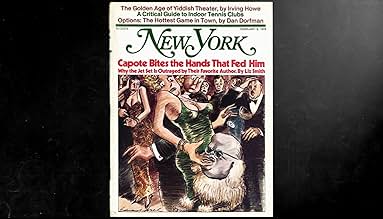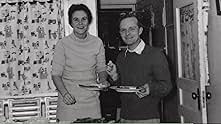Der Aufstieg und Fall von Truman Capote, dem legendären Autor von Frühstück bei Tiffany und Kaltblütig, erzählt von seinen Freunden und Feinden.Der Aufstieg und Fall von Truman Capote, dem legendären Autor von Frühstück bei Tiffany und Kaltblütig, erzählt von seinen Freunden und Feinden.Der Aufstieg und Fall von Truman Capote, dem legendären Autor von Frühstück bei Tiffany und Kaltblütig, erzählt von seinen Freunden und Feinden.
- Auszeichnungen
- 1 Nominierung insgesamt
Truman Capote
- Self - Novelist
- (Archivfilmmaterial)
Marella Agnelli
- Self - 'Swan' and Friend
- (Archivfilmmaterial)
- (Synchronisation)
George Axelrod
- Self - Screenwriter, Breakfast at Tiffany's
- (Archivfilmmaterial)
- (Synchronisation)
Lauren Bacall
- Self - Actress and Friend
- (Archivfilmmaterial)
- (Synchronisation)
Candice Bergen
- Self - Actress
- (Archivfilmmaterial)
- (Synchronisation)
Donald Brooks
- Self - Designer
- (Archivfilmmaterial)
- (Synchronisation)
William F. Buckley
- Self - Commentator
- (Archivfilmmaterial)
- (Synchronisation)
Bob Colacello
- Self - Editor, Interview Magazine
- (Archivfilmmaterial)
- (Synchronisation)
Handlung
WUSSTEST DU SCHON:
- VerbindungenFeatures Frühstück bei Tiffany (1961)
- SoundtracksSyeeda's Song Flute
Written and performed by John Coltrane
Ausgewählte Rezension
Greetings again from the darkness. The audio tapes of interviews George Plimpton conducted for his 1997 biography, "Truman Capote: In Which Various Friends, Enemies, Acquaintances, and Distractors Recall his Turbulent Career", serve as the foundation for this documentary by Ebs Burnough, once a Senior Advisor to former First Lady, Michelle Obama. As fascinating as the tapes are, it's the archival footage, photographs, and additional on-camera interviews that turn this into a well-rounded profile of the enigmatic Truman Capote.
We hear those who knew him describe Capote as seductive, a freak, sleazy, brilliant, fun, and naughty. He's also the author of two literary classics, "Breakfast at Tiffany's" (1958) and "In Cold Blood" (1966). It's the latter which some claim kicked off the celebrity culture (the one that's out of control today), as Capote capitalized on his fame and high society standing to become bigger than the work (insert Norma Desmond line here). Burnough uses the long-standing rumors of Capote's scandalous manuscript, "Answered Prayers" as the structure of his story-telling. For more than 10 years, Capote teased with his anticipated answer to Proust's "In Search of Lost Times". The closest it came to publication was a couple of chapters in Esquire Magazine in 1975. We hear this described as "excerpts of a novel that doesn't exist".
Whether the manuscript exists or not, has little bearing on Burnough's ability to help us understand Capote. Those providing insight include author Jay McInerney ("Bright Lights, Big City, 1984), Capote's long-time partner Jack Dunphy, Pulitzer Prize winning author Norman Mailer (claims Capote "wrote the best sentences"), and Kate Harrington, Capote's adopted daughter (he had a relationship with her father). Ms. Harrington's recollections are quite personal and add a welcome dimension to an otherwise focus on celebrity.
The segment on Capote's 1966 "Black and White" ball at New York's swanky Plaza Hotel is likely the best snapshot of how many remember him. The guest list was truly a who's who among New York high society, intellects, celebrities, and even royalty. By this time, we've learned of Capote's "Swans" - the beautiful and elegant society ladies who constantly escorted him in public. Of course, gay life in those days was quite a bit more challenging, so appearances were crucial.
CAPOTE (2005) with Philip Seymour Hoffman and INFAMOUS (2006) with Toby Jones, stand as the main cinematic depictions of Truman Capote for younger generations. For those of us a bit older, we vividly recall the talk show appearances by this funny little man with the baby voice and effeminate mannerisms. He was an oddity to most of us, in that he looked and sounded quite different, but it was clear he was intelligent and funny. What we didn't know was that drugs, alcohol, and self-absorption were slowly killing him. Capote became a caricature of himself, and by the end in 1984 at age 59 had betrayed many of his friends. Burnough's documentary is all we hoped it would be.
Opens in New York and Los Angeles theaters on September 10, 2021.
We hear those who knew him describe Capote as seductive, a freak, sleazy, brilliant, fun, and naughty. He's also the author of two literary classics, "Breakfast at Tiffany's" (1958) and "In Cold Blood" (1966). It's the latter which some claim kicked off the celebrity culture (the one that's out of control today), as Capote capitalized on his fame and high society standing to become bigger than the work (insert Norma Desmond line here). Burnough uses the long-standing rumors of Capote's scandalous manuscript, "Answered Prayers" as the structure of his story-telling. For more than 10 years, Capote teased with his anticipated answer to Proust's "In Search of Lost Times". The closest it came to publication was a couple of chapters in Esquire Magazine in 1975. We hear this described as "excerpts of a novel that doesn't exist".
Whether the manuscript exists or not, has little bearing on Burnough's ability to help us understand Capote. Those providing insight include author Jay McInerney ("Bright Lights, Big City, 1984), Capote's long-time partner Jack Dunphy, Pulitzer Prize winning author Norman Mailer (claims Capote "wrote the best sentences"), and Kate Harrington, Capote's adopted daughter (he had a relationship with her father). Ms. Harrington's recollections are quite personal and add a welcome dimension to an otherwise focus on celebrity.
The segment on Capote's 1966 "Black and White" ball at New York's swanky Plaza Hotel is likely the best snapshot of how many remember him. The guest list was truly a who's who among New York high society, intellects, celebrities, and even royalty. By this time, we've learned of Capote's "Swans" - the beautiful and elegant society ladies who constantly escorted him in public. Of course, gay life in those days was quite a bit more challenging, so appearances were crucial.
CAPOTE (2005) with Philip Seymour Hoffman and INFAMOUS (2006) with Toby Jones, stand as the main cinematic depictions of Truman Capote for younger generations. For those of us a bit older, we vividly recall the talk show appearances by this funny little man with the baby voice and effeminate mannerisms. He was an oddity to most of us, in that he looked and sounded quite different, but it was clear he was intelligent and funny. What we didn't know was that drugs, alcohol, and self-absorption were slowly killing him. Capote became a caricature of himself, and by the end in 1984 at age 59 had betrayed many of his friends. Burnough's documentary is all we hoped it would be.
Opens in New York and Los Angeles theaters on September 10, 2021.
- ferguson-6
- 8. Sept. 2021
- Permalink
Top-Auswahl
Melde dich zum Bewerten an und greife auf die Watchlist für personalisierte Empfehlungen zu.
- How long is The Capote Tapes?Powered by Alexa
Details
- Erscheinungsdatum
- Herkunftsländer
- Offizielle Standorte
- Sprache
- Auch bekannt als
- Truman Capotes gömda arkiv
- Produktionsfirmen
- Weitere beteiligte Unternehmen bei IMDbPro anzeigen
- Laufzeit1 Stunde 38 Minuten
Zu dieser Seite beitragen
Bearbeitung vorschlagen oder fehlenden Inhalt hinzufügen

Oberste Lücke
By what name was The Capote Tapes (2019) officially released in India in English?
Antwort



































